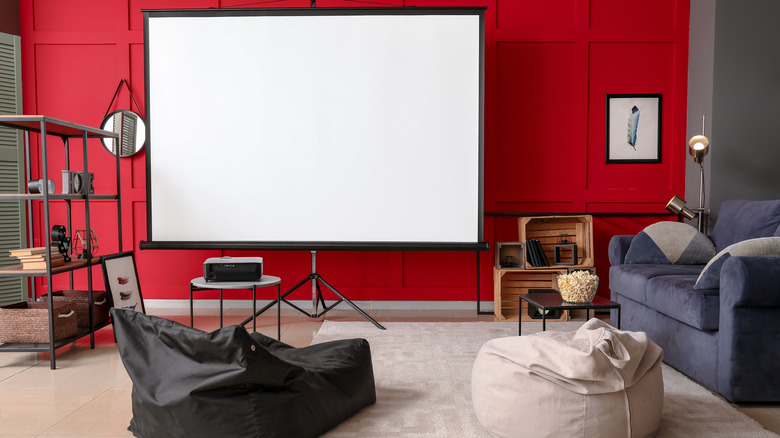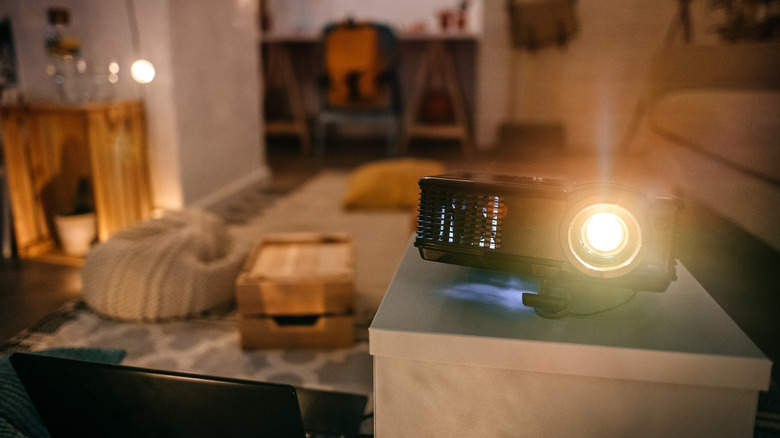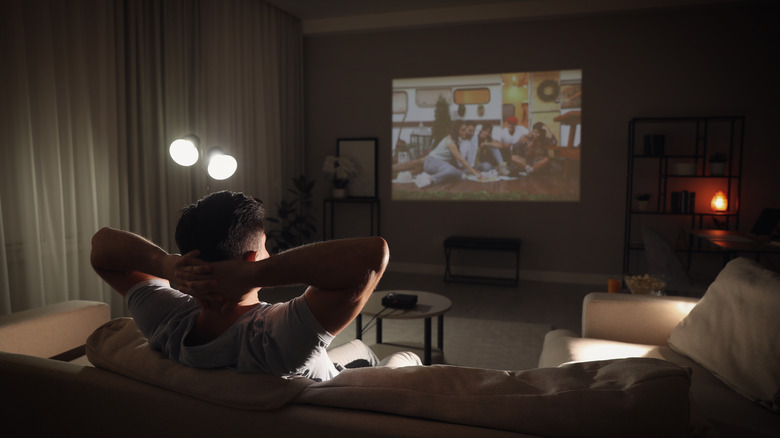Are Expensive Projectors Worth It? Here's Why They Cost So Much
It's happened to many of us. We watch a film on the big screen at a movie theater and dream of bringing that experience home with us. With the right projector, you can enjoy larger-than-life displays and life-like visuals from the comfort of your living room. And it's not just about movies — the same applies to video games, too. With the prices of projectors more affordable than ever, many people are taking the leap, replacing the TVs in their home theaters with projectors to take their viewing experience to the next level.
However, if you've ever shopped for a projector, you've probably noticed they're available at various price points. This may leave you wondering if projectors on the more expensive end of the pricing scale are really worth it. After all, if you're investing in a projector, you want to get the best bang for your buck. Spend your money on the wrong one, and while you may save a few dollars, you could be setting yourself up for a subpar viewing experience.
What sets expensive projectors apart from their lower-priced counterparts are ultra-high-definition resolution, incredible color accuracy, and enhanced connectivity options, which can be appealing if you seek movie-quality visuals at home. Considering today's budget-friendly projectors are often quite advanced, a high-end projector may not improve the viewing experience enough to justify its hefty price tag, making it more of a luxury than a necessity.
Why are high-end projectors so expensive?
When you start shopping for projectors, you'll come across several different types, including digital light processing (DLP), liquid crystal display (LCD), light-emitting diode (LED), and laser projectors. Prices vary significantly depending on the type of technology used, with LED and entry-level DLP projectors being among the most affordable. From there, LCD projectors tend to have a mid-range price tag, while laser projectors come in at the high end of the price range.
High-end projectors stand out because of their advanced imaging technology. If you're willing to pay the price tag, you'll get a higher-resolution projector, such as 4K, than its more economically priced competitors. Higher resolution means incredibly sharp and detailed images that can make you feel right in the middle of the action, whether watching a movie or playing a video game.
These projectors have contrast ratios that are much higher than lower-priced models, resulting in deeper blacks and more vibrant colors. This difference becomes especially noticeable in dark scenes where cheaper projectors often struggle. You'll also find that expensive projectors have more precise color reproduction, essential for an authentic cinematic experience at home.
Light years ahead
A projector's light source can make or break its overall performance and longevity, making it another important factor in differentiating high-end projectors from lower-cost alternatives. Expensive projectors often use LED or laser light sources, which deliver superior image quality and last much longer than traditional lamps. While you'll pay a premium price upfront for this advanced technology, you'll enjoy lower maintenance costs and won't have to replace the lamps as frequently.
Besides using better light sources, high-end projectors have a broader range of connectivity options, like wireless streaming and smart capabilities. High-end projectors are typically more sophisticated and user-friendly, with features like touch screens, intuitive menus, and better remote controls. In contrast, lower-cost projectors might have basic interfaces that are less intuitive and more difficult to navigate.
High-end projectors also usually have a better build quality, making them more durable and enhancing their performance through better heat management and less noise. While lesser-priced projectors will meet the needs of many, they may be more prone to wear and tear over time. Despite their higher initial cost, their advanced features and longer lifespan can make them a cost-effective option in the long term.
Balancing cost and quality
If you can afford to spend extra cash on a high-end projector, chances are you'll find it worth it. Expensive projectors offer better image quality than cheaper alternatives, allowing them to produce clear and vibrant images even in well-lit rooms, something that's especially important when you have no control over the ambient light. Their ability to handle various lighting conditions starkly contrasts with lower-cost models, which may struggle with washout or lack clarity in similar situations.
Even though the high price tag may take you aback at first glance, premium projectors often offer greater value in the long term than less expensive versions. Since they're typically built with higher quality materials and have better construction, expensive projectors are less prone to issues requiring repair or replacement.
The cost of maintaining a high-end projector is generally lower, especially if you choose a model with LED or laser light sources, which have longer lifespans than traditional lamps. The feature-rich experience they deliver — including higher resolution, better color accuracy, and advanced connectivity options — often makes these pricier projectors worth the cost in the long run.



